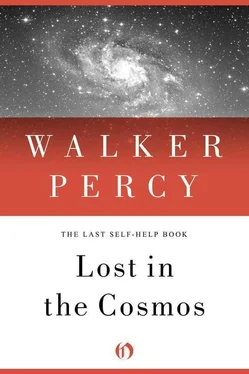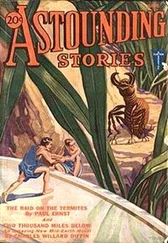(CHECK ONE)
Thus, ordinary four-legged tables have long since been emptied out and rendered invisible.
Even the cobbler’s bench, which, for a while, resisted the ravenous self and for some years remained a cobbler’s bench upon which one could set drinks and art books, has now disappeared into the vacuole and become as invisible as a Danish modern. The cobbler’s bench has become in fact a table. Tables are now being manufactured which look like cobblers’ benches but are not.
Thought Experiment: Try to imagine the circumstances under which the fifty non-tables converted to use as coffee tables would become less and less desirable until one would actually prefer an ordinary table constructed of four legs and a top. E.g., imagine you are an archeologist of the twenty-first century, exploring the abandoned beach cottages of Martha’s Vineyard and finding all manner of strange artifacts used as tables — pieces of driftwood, capstans, shark jaws— and that you need a good worktable and, not recognizing these objects as tables, you construct a simple and sturdy table from a plank of wood and four lengths of two-by-fours.
Thought Experiment (II): Consider to what extent an “antique” is prized because it is excellently made and beautiful and to what extent it is prized because it is an antique and as such is saturated with another time and another place and is therefore resistant to absorption by the self — just as a pine piling saturated in creosote resists corrosion by the sea — and thus possesses a higher coefficient of informing power for the nought of self.
If you say that a writing table made by Thomas Sheraton is of value because it is excellently made and beautiful, how would you go about making a writing table now that would be similarly prized as an antique two hundred years from now?
The real question of course is whether the twentieth-century self is different from the eighteenth-century self, both in its reliance on “antiques” to inform itself and in its ability to make a writing table which is graceful and useful and for no other reason. Was a well-to-do eighteenth-century Englishman content to buy a Sheraton writing table, or would he have preferred a fifteenth-century “antique”?
*Yet another article (The New York Times, September 3, 1981) listed the following objects which were offered for sale and specifically for use as coffee tables: walnut clock ($2,200), ventilator duct grills ($300), sandstone mask ($250), ionic column capital ($400), Nigerian chieftain’s stool ($2,500), nineteenth-century English camphor chest ($2,350), trundle pine storage box ($550), nineteenth-century Norman poultry cage ($450), Korean coin chest ($350), fiberboard musical-instrument case ($175), Chinese bamboo trunk ($50).
The Self as Nought (II): Why Most Women, and Some Men, are Subject to Fashion
THERE IS NO FASHION so absurd, even grotesque, that it cannot be adopted, given two things: the authority of the fashion-setter (Dior, Jackie Onassis) and the vacuity or noughtness of the consumer. E.g., bustles in the West, bound feet in the East.
It happens that a woman will see a new fashion, a certain kind of hat, a new hairstyle, the cut and length of a skirt, a French-wrap swimsuit, and she will want it. She buys it. Often the source of the fashion is a famous and attractive person or a well-known couturier.
It is illuminating that some fashions are set by mistake. It is reported, for example, that when Wallis Warfield Simpson appeared at Ascot with the second button of her blouse left inadvertently unbuttoned, millions of women followed suit. And when John Wayne’s belt buckle slipped to one side in a scene in the movie Red River, thousands of urban cowboys began to buckle their belts to the side.
In a certain New York disco located near a hospital, interns and nurses would drop in at all hours wearing their hospital greens. Whereupon it became fashionable for non-medical people to go discoing in wrinkled hospital greens — which are now sold at J. C. Penney. *
The efficacy of fashion turns on the self’s perception of itself either as a nought or at least as lacking something, and its perception or misperception of the splendid wholeness of public figures as evidenced by even the most carelessly worn badges of their substantiality — when in truth the selves of Jackie Onassis and Wallis Simpson and John Wayne are probably more insubstantial than most.
Question: What does the saleslady mean when she fits a customer with an article of clothing and says: “It’s you”?
(a) She means the same thing the customer means if you should ask her: It is becoming to me. It looks nice. I don’t have a thing to wear. *It does something for me.
(b) She means that it — the hat, blouse, hairstyle, dress — actually accentuates your best features — eyes, hair — while minimizing your worst: no neck, etc.
(c) It will please your husband or lover.
(d) It will impress other women.
(e) Most other women are already wearing it and you look dowdy without it.
(f) The saleslady means what she says. It really is you. That is, you are not much without it, you perceive yourself as mousy, and you are a something — your self in fact, your new true self — with it.
(CHECK ONE)
But if the saleslady means what she says — and since you have gone through any number of such styles in the past— then it must follow that the other articles in the past were also you and are no longer. How can that be? It could only be because some sort of consumption takes place. The nought which is you has devoured the style and been sustained for a while as a non-you until the style is emptied out by the noughting self.
Consider the stages of the consumption:
First stage: You see an article or a style worn by a person with a certain authority. At first glance it seems outlandish, even absurd. Or ugly, like the long skirt of the New Look of the 1950s.
Second stage: You see more people wearing it. It is still outlandish, but it is an outlandish something and you are fading.
Third stage: You try it on. The saleslady says it is you. You laugh, shrug, shake your head, but secretly the possibility is born that it can be you.
Fourth stage: You buy it and wear it. For a while, it is you and you are it. That is, you perceive it as informing you and you as informed, either as a new you or the old real you which has never come to light before.
Fifth stage: Gradually the new style becomes everyday, quotidian, rendered neutral. No matter how exotic it is, like a morsel to which an amoeba is attracted and which it surrounds and takes into itself, it is devoured and becomes part of the transparent flowing substance of the amoeba.
Sixth stage: After a sufficient lapse of time, the husk or residue of the new style is excreted and becomes an oddity, a slightly shameful thing but still attached, like the waste in the excretory vacuole of the amoeba.
If you don’t believe this, take a look at an old snapshot of yourself wearing a Jackie-O pillbox hat twenty years ago — or a ducktail Elvis haircut. You will laugh or frown and put it away. It looks queer. It is not only not you. It is a not-you.
Thought Experiment: Assuming there is a certain perceived, or misperceived, authority behind the setting of a fashion, e.g., the attractiveness and fame of a Jackie O, John Wayne, or the putative knowledgeability of Dior, try to imagine the nature of the authority of the fashion-setter and the state of mind of the consumer which brought it to pass that women wore bustles, which made their rear ends grotesquely prominent when women’s rear ends are already more prominent, relatively speaking, than any other mammal’s.
Читать дальше












